#act of union
Explore tagged Tumblr posts
Text
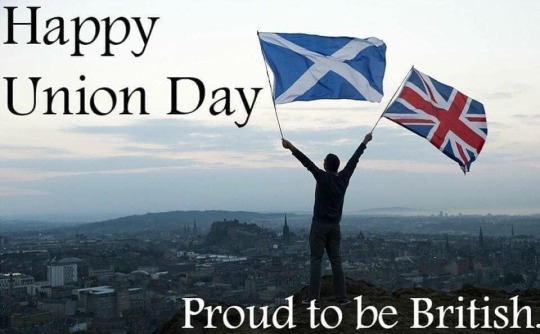
Union Day 2024 - What unites us is greater than what divides us.
#Union Day#Act of Union#1 May 1707#England#Scotland#Great Britain#Edinburgh#Union flag#Scottish saltire#flags#national unity#loyalty#mother country#United Kingdom#UK
62 notes
·
View notes
Note
Haven't the same sovereign didn't really united the kingdoms under a single government with the House of Orange or House of Hanover so wondering if Scotland's bankruptcy over the Darien expedition matter more to uniting the kingdoms than the accession in England of the House of Stuart?
Ok, I think I get what you're driving at.
So the important thing is that a personal union is not the same thing as a real union or a political union, and so on and so forth. In a personal union, you have two (or more) separate and independent governments that just happen to share the same monarch.

When it comes to Scotland's political union with England, I would agree that the failed Darien scheme (in which Scotland sank about 20% of all the money in the country into setting up a colony in Panama, only for 80% of the colonists to die in the first year) played a significant role in getting the Scottish Parliament to agree to the Act of Union in 1707.
But it wasn't the only factor. (After all, there had been periodic efforts to pass an Act of Union for a hundred years, under both the Stuarts and the House of Orange, which failed due to religious politics.) So what were some of the factors?
Royal succession was a major issue. After the Glorious Revolution of 1688 and the Jacobite Rising of 1689, the governments of both England and Scotland realized that the question of succession was a major national security issue for both countries. However, it was not clear that England and Scotland would remain in personal union after the reign of Queen Anne, largely due to disagreement over which particular Protestant monarch would be chosen that were actually a proxy for economic conflicts...
Trade was a major motivation. When the Scottish Parliament passed the Act of Security of 1704, which mandated that Scotland's choice of the next monarch would have to be different from that of England unless England agreed to free trade with Scotland, the English Parliament used the Alien Act of 1705 to ban exports from Scotland to England (which was around 50% of Scotland's total international trade at the time) in order to strong-arm the Scottish government into negotiating over union.
Naval policy was a major motivation. As a small independent kingdom, Scotland's merchant marine fleet got hit pretty badly by privateers during the many European wars of the late 17th/early 18th century. Union would mean protection for Scottish merchant ships from the increasingly powerful English (soon to be British) navy.
#history#scottish history#english history#british history#act of union#darien scheme#personal union#political union
19 notes
·
View notes
Text
#OTD in 1803 – In opposition to the Act of Union, Robert Emmet leads an armed outbreak that is easily suppressed.
Born in Dublin in 1778 into a fairly-well-to-do Protestant family, Robert Emmet was educated at Trinity College, Dublin. With high ideals of fraternity and equality, Robert, like his elder brother Thomas, became involved with the United Irishmen – an organisation formed in 1791 by Wolfe Tone, James Tandy, and Thomas Russell to achieve Roman Catholic emancipation and, with Protestant cooperation,…
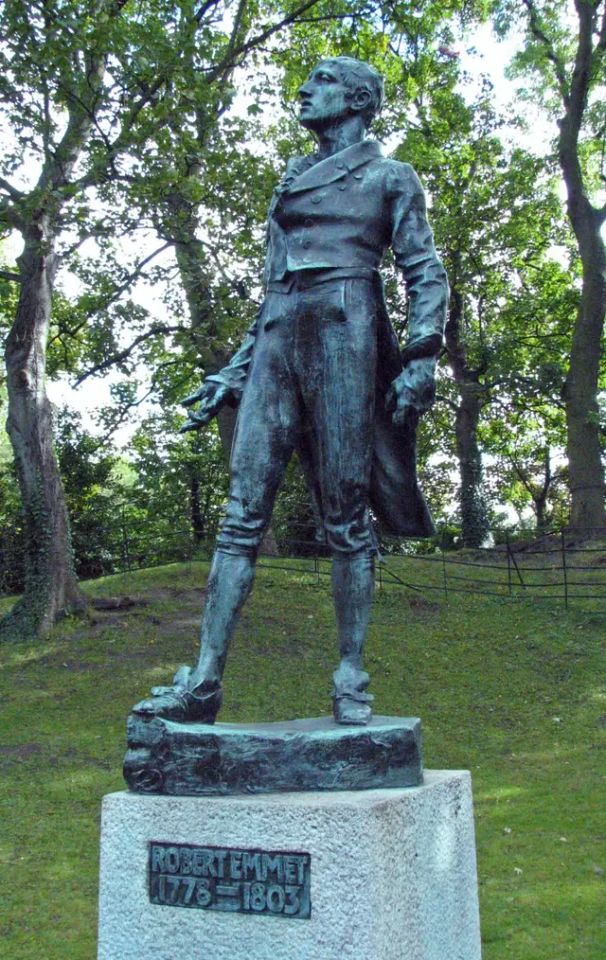
View On WordPress
#Act of Union#Dublin#History#History of Ireland#Ireland#Irish History#Robert Emmet#Today in Irish History#United Irishmen Rebellion
7 notes
·
View notes
Text
In Pocahontas (1995), Ratcliffe claims Virginia using a Union Flag. This is anachronistic, since while England and Scotland were in personal union (common monarch) from 1603 under King James VI of Scotland (James I of England), the Act of Union (unification of crowns) was not passed until 1707 under his great granddaughter Anne, a hundred years after the movie is set. However, since James VI/I was a great believer in the importance of personal union and styled himself as King of Great Britain, the anachronistic use of the Union Flag marks Ratcliffe as aligned with the royal will instead of the national interest. In this essay I will
1 note
·
View note
Text
Alfred: I'm afraid I don't have any open positions right now available
Danny: There isn't? But what about the ad on Gotham Job Connects saying a nanny was needed at Wayne Manor?
Alfred: I am unsure how that go on there but I can assure you, no one here put up that-
Damian: Excuse me, are you Daniel Fenton?
Danny: *Blinks down at child* Oh um yes I am.
Damian: Excellent. You're right on time for your interview. Please follow me.
Alfred: Master Damian? You put up a ad for a nanny?
Damian: That's right.
Alfred: You....want someone to care for you?
Damian: Heavens no. I'm searching for a nanny for the real child of the house. I know you're overwhelmed with the day to day duties running the household and didn't want you to have a heart attack from the stress. A professional nanny would lift the load off your shoulders.
Danny: That's so sweet that you care so much for your staff. Who's the child you want someone to help take care of? You're baby brother or sister?
Damian: My father.
Danny: .....
Alfred embarrassed: Master Damian....why would you-?
Damian: Richard says Father acts like a child, and children need minding if they make idiotic decisions too often.
Danny: .....
Alfred: I'm terrible sorry about this young man. I'll reimburse any millage you wasted driving out here.
Danny: No, it's okay. I-
Damian: The pay is fifty dollars a hour. Eighty hours every two weeks. We cover all benefits such as medical, dental, vision and auto insurance, and lodging can be provided if needed. Depending on how long we need your services I'll set up a retirement fund for you matching your bi-weekly pay.
Danny: So I would be like a in home caregiver? Most of my experience is with children but I'm sure I could handle your father.
Alfred: Master Damian!
Damian: *Hands Alfred a piece of paper*
Alfred after reading it: How soon can you start sir?
#dcxdpdabbles#dcxdp crossover#from a fic i never wrote#Damian hires Nanny for Bruce because he acts like a child#The paper convinced Alfred.#Eventual Spirt Halloween#Danny doesnt know whats going on byt thats too good of a job to pass#Dick is cackling#He said that in anger not knowing Damian took it to heart#Damian Head of the Union Wayne
4K notes
·
View notes
Text

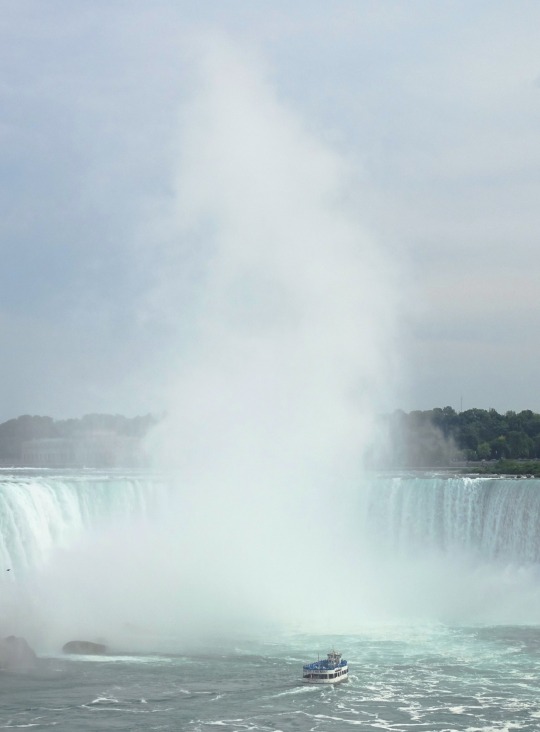






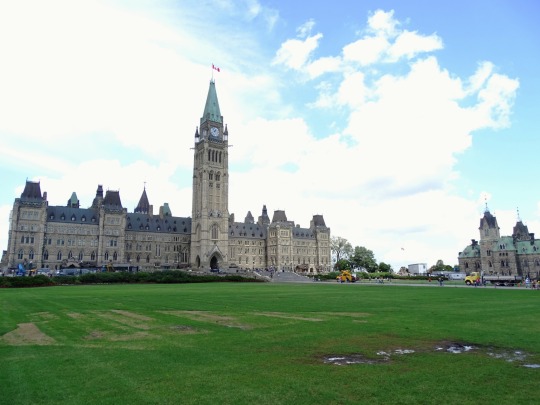


The Province of Canada was created by the Act of Union on July 23, 1840.
#Province of Canada#created#Act of Union#23 July 1840#anniversary#travel#Canadian history#Québec#Quebec CIty#original photography#architecture#landscape#cityscape#Trois-Rivières#Niagara Falls#2015#Fort York National Historic Site of Canada#summer 2018#2012#Toronto#Château Ramezay#Montréal#Ottawa#St. Lawrence River#Lake Huron#Wawa#Chippewa Falls#vacation#tourist attraction#Canada
0 notes
Text
All bets are off
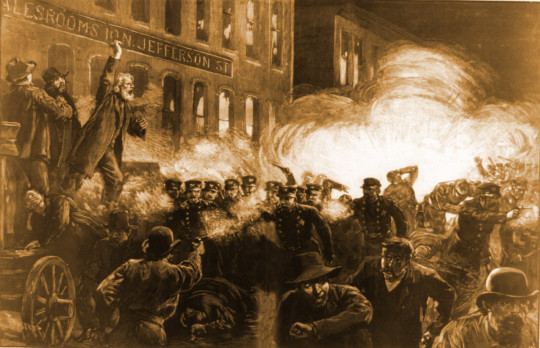
When unions are outlawed, only outlaws will have unions. Unions don't owe their existence to labor laws that protect organizing activities. Rather, labor laws exist because once-illegal unions were formed in the teeth of violent suppression, and those unions demanded – and got – labor law.
Bosses have hated unions since the start, and they've really hated laws protecting workers. Dress this up in whatever self-serving rationale you want – "the freedom to contract," or "meritocracy" – it all cashes out to this: when workers bargain collectively, value that would otherwise go to investors and executives goes to the workers.
I'm not just talking about wages here, either. If an employer is forced – by a union, or by a labor law that only exists because of union militancy – to operate a safe workplace, they have to spend money on things like fire suppression, PPE, and paid breaks to avoid repetitive strain injuries. In the absence of some force that corrals bosses into providing these safety measures, they can use that money to pay themselves, and externalize the cost of on-the-job injuries to their workers.
The cost and price of a good or service is the tangible expression of power. It is a matter of politics, not economics. If consumer protection agencies demand that companies provide safe, well-manufactured goods, if there are prohibitions on price-fixing and profiteering, then value shifts from the corporation to its customers.
Now, if labor has few rights and consumers have many rights, then bosses can pass their consumer-side losses on to their workers. This is the Walmart story, the Amazon story: cheap goods paid for with low wages and dangerous working conditions. Likewise, if consumer rights are weak but labor rights are strong, then bosses can pass their costs onto their customers, continuing to take high profits by charging more. This is the story of local gig-work ordinances like NYC's, which guaranteed a minimum wage to delivery drivers – restaurateurs responded by demanding the right to add a surcharge to their bills:
https://table.skift.com/2018/06/22/nyc-surcharge-debate/
But if labor and consumer groups act in solidarity, then they can operate as a bloc and bosses and investors have to eat shit. Back in 2017, the pilots' union for American Airlines forced their bosses into a raise. Wall Street freaked out and tanked AA's stock. Analysts for big banks were outraged. Citi's Kevin Crissey summed up the situation perfectly, in a fuming memo: "This is frustrating. Labor is being paid first again. Shareholders get leftovers":
https://www.vox.com/new-money/2017/4/29/15471634/american-airlines-raise
Limiting the wealth of the investor class also limits their power, because money translates pretty directly into political power. This sets up a virtuous cycle: the less money the investor class has to spend on political projects, the more space there is for consumer- and labor-protection laws to be enacted and enforced. As labor and consumer law gets more stringent, the share of the national income going to people who make things, and people who use the things they make, goes up – and the share going to people who own things goes down.
Seen this way, it's obvious that prices and wages are a political matter, not an "economic" one. Orthodox economists maintain the pretense that they practice a kind of physics of money, discovering the "natural," "empirical" way that prices and wages move. They dress this up with mumbo-jumbo like the "efficient market hypothesis," "price discovery," "public choice," and that old favorite, "trickle-down theory." Strip away the doublespeak and it boils down to this: "Actually, your boss is right. He does deserve more of the value than you do":
https://pluralistic.net/2024/09/09/low-wage-100/#executive-excess
Even if you've been suckered by the lie that bosses have a legal "fiduciary duty" to maximize shareholder returns (this is a myth, by the way – no such law exists), it doesn't follow that customers or workers share that fiduciary duty. As a customer, you are not legally obliged to arrange your affairs to maximize the dividends paid by to investors in your corporate landlord or by the merchants you patronize. As a worker, you are under no legal obligation to consider shareholders' interests when you bargain for wages, benefits and working conditions.
The "fiduciary duty" lie is another instance of politics masquerading as economics: even if bosses bargain for as big a slice of the pie as they can get, the size of that slice is determined by the relative power of bosses, customers and workers.
This is why bosses hate unions. It's why the scab presidency of Donald Trump has waged all-out war on unions. Trump just effectively shuttered the National Labor Relations Board, unilaterally halting its enforcement actions and investigations. He also illegally fired one of the Democratic NLRB board members, leaving the agency with too few board members to take any new actions, meaning that no unions can be recognized – indeed, the NLRB can't do anything – for the foreseeable future:
https://www.npr.org/2025/01/28/nx-s1-5277103/nlrb-trump-wilcox-abruzzo-democrats-labor
Trump also fired the NLRB's outstanding General Counsel, Jennifer Abruzzo, who was one of the stars of the Biden administration, who promulgated rules that decisively tilted the balance in favor of labor:
https://pluralistic.net/2023/09/06/goons-ginks-and-company-finks/#if-blood-be-the-price-of-your-cursed-wealth
Trump is playing Grinch here – he's descended upon Whoville to take all the Christmas decorations, in the belief that these are the source of Christmas. But the Grinch was wrong (and so is Trump): Christmas was in the heart of the Whos, and the tinsel and baubles were the expression of that Christmas spirit. Likewise, labor rights come from labor organizing, not the other way around.
Labor rights were enshrined in federal law in 1935, with the National Labor Relations Act. Bosses hated – and hate – the NLRA. 12 years later, they passed the Taft-Hartley Act, which substantially gutted the NLRA. Most notably, Taft-Hartley bans "sympathy strikes" – when unions walk out in support of one another. Sympathy strikes are a hugely powerful way for workers to claim value away from bosses and investors, which is why bosses got rid of them.
But even then, bosses who were honest with themselves would admit that they preferred life under the NLRA to life before it. Remember: labor militancy created the NLRA, not the other way around. When workers didn't have the legal means to organize, they organized by illegal means. When they didn't have legal ways of striking, they struck illegally. The result was pitched battles, even bloodbaths, as cops beat and even killed labor organizers. Bosses hired thugs who committed mass murder – literally. In 1913, strikebreakers working for the Calumet and Hecla Mining Company started a stampede during a union Christmas party that killed 73 people, including many copper miners' children:
https://en.wikipedia.org/wiki/Italian_Hall_disaster
Workers didn't take this lying down. Violence was met with violence. Bombs went off outside factories and stately mansions. There was gunfire and arson. Bosses had to hire armed guards to escort them as they scurried between their estates and their fancy parties and their executive offices. The country was in a state of near-perpetual chaos.
The NLRA created a set of rules for labor/boss negotiations – rules that helped workers claim a bigger slice of the pie without blood in the streets. But the NLRA also had benefits for bosses: unions were obliged to play by its rules, if they wanted to reap its benefits. The NLRA didn't just put a ceiling over boss power – it also put a ceiling over worker militancy. Von Clausewitz says that "war is politics by other means," which implies that politics are war by other means. The alternative to politics isn't capitulation, it's war.
Trump has torn up the rules to the labor game, but that doesn't mean the game ends. That just means there are no rules.
The labor movement has many great organizer/writers, but few can match the incredible Jane McAlevey, who died of cancer last summer (rest in power). In her classic A Collective Bargain, McAlevey describes her organizer training, from a tradition that went back to the days before the National Labor Relations Act:
https://pluralistic.net/2023/04/23/a-collective-bargain/
McAlevey was very clear that labor law owes its existence to union power, not the other way around. She explains very clearly that union organizers invented labor law after they invented unions, and that unions can (and indeed, must) exist separately from government agencies that are charged with protecting labor law. But she goes farther: in Collective Bargain, McAlevey describes how the 2019 LA Teachers' Strike didn't just win all the wage and benefits demands of the teachers, but also got the school district to promise to put a park or playground near every school in the system, and got a ban on ICE agents harassing parents at the school gates.
This wildly successful strike forged bonds among teachers, and between teachers and their communities. These teachers went on to run a political get-out-the-vote campaign in the 2020 elections and elected two Democratic reps to Congress and secured the Dems' majority. McAlevey contrasted the active way good unions involve workers as participants with the thin, anemic way that the Democratic Party engages with supporters – solely by asking them for money in a stream of frothing, clickbait text messages. As McAlevey wrote, "Workplace democracy is a training ground for true national democracy."
Militant labor doesn't just protect labor rights – it protects human rights. Remember: MLK, Jr was assassinated while campaigning for union janitors in Memphis. LA teachers ended ICE sweeps at the school gates. Librarian unions are leading the fight against book bans.
The good news is that public opinion has swung wildly in favor of unions over the past decade. More people want to join unions than at any time in generations. More people support unions that at any time in generations.
The bad news is that union leadership fucking suuuuuuuucks. As Hamilton Nolan writes, union bosses are sitting on vast, heretofore unseen warchests of cash, and they just experienced a four-year period of governmental support for unions unheard of since the Carter administration, and they did fuck all with that opportunity:
https://www.hamiltonnolan.com/p/confirmed-unions-squandered-the-biden
Big unions have effectively stopped trying to organize new workers, even when workers beg them for help forming a union. Union organizing budgets are so small as to be indistinguishable from zero. Despite the record number of workers who want to be in a union, the number of workers who are in a union actually fell during the Biden years.
Indeed, some union bosses actually campaigned for Trump, a notorious scab. Teamsters boss Sean O'Brien spoke at the fucking RNC, a political favor that Trump repaid by killing the NLRB and every labor enforcement action and investigation in the country. Nice one, O'Brien. See you in hell:
https://www.theatlantic.com/politics/archive/2024/08/teamster-union-trump/679513/
Union bosses squandered a historical opportunity to build countervailing power. Now, Trump's stormtroopers are rounding up workers with the goal of illegally deporting them. Fascism is on the rise. Labor and fascism are archenemies. Organized labor has always been the biggest threat to fascism, every time it has reared its head. That's why fascists target unions first. Union bosses cost us an organized force that could effectively defend our friends and neighbors from Trump's deportation stormtroopers:
https://prospect.org/blogs-and-newsletters/tap/2025-01-28-trumps-lawbreaking-also-aimed-at-workers/
Not every union boss is a scab like O'Brien. Shawn Fain, head of the UAW, won an historic strike against all three of the Big Three automakers, and made sure that the new contracts all ran out in 2028, and called on other unions to do the same, so that the country could have a general strike in 2028 without violating the Taft-Hartley Act (Fain was operating on the now-dead assumption that unions had to play by the rules):
https://pluralistic.net/2024/11/11/rip-jane-mcalevey/#organize
A general strike isn't just a strike for workers' rights. Under Trump, a general strike is a strike against Trumpism and all its horrors: kids in cages, forced birth, trans erasure, climate accelerationism – the whole fucking thing.
A general strike would build the worker power to occupy the Democratic Party and force it to stand up for the American people against oligarchy, rather than meekly capitulating to fascism (and fundraising), which is all they know how to do anymore:
https://pluralistic.net/2025/01/10/smoke-filled-room-where-it-happens/#dinosaurs
But before we can occupy the Dems, we have to occupy the unions. We need union bosses who are committed to signing up every worker who wants workplace democracy, and unionizing every workplace in spite of the NLRB, not with its help. We need to go back to our roots, when there were no rules.
That's the world Trump made. We need to make him regret that decision.

If you'd like an essay-formatted version of this post to read or share, here's a link to it on pluralistic.net, my surveillance-free, ad-free, tracker-free blog:
https://pluralistic.net/2025/01/29/which-side-are-you-on/#strike-three-yer-out
#pluralistic#labor#nlra#nlrb#jennifer abruzzo#national labor relations board#national labor relations act#unions#organize#general strike#general strike 2028
3K notes
·
View notes
Text

Chil becoming a union organizer for half foots makes so much sense because literally any time a half foot was in chil’s vicinity he was looking out for them
Like when marcille & senshi transformed


And with mickbell


#dungeon meshi#dunmeshi#chilchuck#dunmeshi spoilers#dungeon meshi spoilers#mfs acting like chil already being a union man was a huge plot point instead of smth mickbell mentioned once#damn#chill out…get it? no ok#but I’m about to pull out the plankton meme fr
8K notes
·
View notes
Text
Homeless kids love Biryani treats ! they wanted more😊💗 #kindness #help #love #peace #humanity
#kindness#lovers#help#positivity#act of kindness#act of grace#act of union#act of love#sharing is caring#loving#pets#doglover#happy#humanity
1 note
·
View note
Text
An informative essay
The shameful dying days of Scotland’s independence before the Act of Union
View On WordPress
0 notes
Text
An informative essay
The shameful dying days of Scotland’s independence before the Act of Union
View On WordPress
0 notes
Text
Let us be brutally honest with ourselves and with eachother for a moment. If he weren't obese you motherfuckers would be capable of percieving evrart claires sexy sexy moral ambiguity and complex charms
#i am (lesbian) sipping him like a fine DESSERT WINE#my evidence by the way is very simple and very damning. joyce messier. there i said it.#if you guys can appreciate the fact that Joyce is a complex figure worthy of disgust yes but also worthy of empathy#despite being a venal coward facilitating acts of violence and slaughter of the organized working poor of martinaise in the name of capital#if you can understand that she is a dimensional figure while also being an embodiment of the moral apathy and cruelty if capital owners#but you cant look at evrart and see that he is (while deeply flawed and morally suspect) also a dimensional figure#on top of the fact that his motivations are eminently relatable and dare i say it baser#and his greatest failing imho is in failing to advocate for the interests of *all* the poor of martinaise#opting instead to marginalize the inhabitants of the fishing village in favor of a power grab in the interests of himself and his union#though this is imo a bit of a grey area morally. undeniably a wrong and bad thing to do but done in service of clairs political goals#to gather power to advocate for the working class against ultraliberal monoliths like wild pines and fascistic orgs like krenel#still super wrong but i can follow the moral arithmetic there tho i don't like it#but like my point is if u can see that joyce is evil and pathetic but still cool and sexy but you consider clair flatly distasteful#thats cus hes not conventionally attractive#cus he is *every bit* as dimensional and interesting as joyce and he is not nearly as politically shite even if hes interpersonally a jerk
2K notes
·
View notes
Text

“They have fallen to darkness.”
I’ve had this sketch lying around for weeks and just decided to color it.
Ive just been thinking of player and how they go from someone who wasn’t ready for responsibilities to someone who can change the tides of battle. The sole survivor of the keyblade war who could handle themselves against the foretellers (although they never fully committed to fighting you fully). Just an all out force of reckoning by endgame.
Not to mention they don’t remember a thing and just going with the flow. Do you think they gave them a tldr of everything or theyre too busy trying to stop the data world from falling apart. I wonder if darkness really thought player was the weakest link out of the trio or knew they were the biggest threat.
They really gave the sacrificial best friend role to the player and I love them for that. Little guy played darkness like a fiddle for their friends.
#my art#kingdom hearts#kh#khux#kingdom hearts union cross#fanart#kh ephemer#kh skuld#keykids#kh player#player deserves an acting award#and an award for how much bs their friends put them through
324 notes
·
View notes
Text
Spent four hours this afternoon doing unpaid labor for my union's women's committee, trying to promote an event for solidarity between workers. Posted it on my city's subreddit and the first four responses are people bitching that we used AI on the poster and are "stealing artists jobs" - a poster which was, again, created by a member of my union, unpaid on her own time, for a social media post. Because you know, if she hadn't used AI we would have spent hundreds of dollars paying an artist instead of using, like, a stock photo.
Could the anti-AI people focus. For like a second. On literally anything that matters.
#'this isn't very union-like' THE NLRB IS IN SHAMBLES. THEY'RE TRYING TO REPEAL OSHA#WHETHER THE POSTER USES CLIPART OR AI IS NOT EXACTLY ON MY LABOR RADAR RIGHT NOW#anyway it's fucking dumb to act like an organization is stealing artist's jobs for shit they would've used free stock images for
235 notes
·
View notes
Text
Antiusurpation and the road to disenshittification
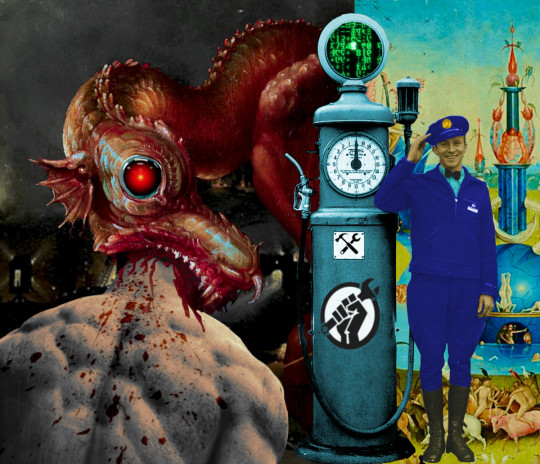
THIS WEEKEND (November 8-10), I'll be in TUCSON, AZ: I'm the GUEST OF HONOR at the TUSCON SCIENCE FICTION CONVENTION.

Nineties kids had a good reason to be excited about the internet's promise of disintermediation: the gatekeepers who controlled our access to culture, politics, and opportunity were crooked as hell, and besides, they sucked.
For a second there, we really did get a lot of disintermediation, which created a big, weird, diverse pluralistic space for all kinds of voices, ideas, identities, hobbies, businesses and movements. Lots of these were either deeply objectionable or really stupid, or both, but there was also so much cool stuff on the old, good internet.
Then, after about ten seconds of sheer joy, we got all-new gatekeepers, who were at least as bad, and even more powerful, than the old ones. The net became Tom Eastman's "Five giant websites, each filled with screenshots of the other four." Culture, politics, finance, news, and especially power have been gathered into the hands of unaccountable, greedy, and often cruel intermediaries.
Oh, also, we had an election.
This isn't an election post. I have many thoughts about the election, but they're still these big, unformed blobs of anger, fear and sorrow. Experience teaches me that the only way to get past this is to just let all that bad stuff sit for a while and offgas its most noxious compounds, so that I can handle it safely and figure out what to do with it.
While I wait that out, I'm just getting the job done. Chop wood, carry water. I've got a book to write, Enshittification, for Farar, Straus, Giroux's MCD Books, and it's very nearly done:
https://twitter.com/search?q=from%3Adoctorow+%23dailywords&src=typed_query&f=live
Compartmentalizing my anxieties and plowing that energy into productive work isn't necessarily the healthiest coping strategy, but it's not the worst, either. It's how I wrote nine books during the covid lockdowns.
And sometimes, when you're not staring directly at something, you get past the tunnel vision that makes it impossible to see its edges, fracture lines, and weak points.
So I'm working on the book. It's a book about platforms, because enshittification is a phenomenon that is most visible and toxic on platforms. Platforms are intermediaries, who connect buyers and sellers, creators and audiences, workers and employers, politicians and voters, activists and crowds, as well as families, communities, and would-be romantic partners.
There's a reason we keep reinventing these intermediaries: they're useful. Like, it's technically possible for a writer to also be their own editor, printer, distributor, promoter and sales-force:
https://pluralistic.net/2024/02/19/crad-kilodney-was-an-outlier/#intermediation
But without middlemen, those are the only writers we'll get. The set of all writers who have something to say that I want to read is much larger than the set of all writers who are capable of running their own publishing operation.
The problem isn't middlemen: the problem is powerful middlemen. When an intermediary gets powerful enough to usurp the relationship between the parties on either side of the transaction, everything turns to shit:
https://pluralistic.net/2022/06/12/direct-the-problem-of-middlemen/
A dating service that faces pressure from competition, regulation, interoperability and a committed workforce will try as hard as it can to help you find Your Person. A dating service that buys up all its competitors, cows its workforce, captures its regulators and harnesses IP law to block interoperators will redesign its service so that you keep paying forever, and never find love:
https://www.npr.org/sections/money/2024/02/13/1228749143/the-dating-app-paradox-why-dating-apps-may-be-worse-than-ever
Multiply this a millionfold, in every sector of our complex, high-tech world where we necessarily rely on skilled intermediaries to handle technical aspects of our lives that we can't – or shouldn't – manage ourselves. That world is beholden to predators who screw us and screw us and screw us, jacking up our rents:
https://www.thebignewsletter.com/p/yes-there-are-antitrust-voters-in
Cranking up the price of food:
https://pluralistic.net/2023/10/04/dont-let-your-meat-loaf/#meaty-beaty-big-and-bouncy
And everything else:
https://pluralistic.net/2023/11/06/attention-rents/#consumer-welfare-queens
(Maybe this is a post about the election after all?)
The difference between a helpmeet and a parasite is power. If we want to enjoy the benefits of intermediaries without the risks, we need policies that keep middlemen weak. That's the opposite of the system we have now.
Take interoperability and IP law. Interoperability (basically, plugging new things into existing things) is a really powerful check against powerful middlemen. If you rely on an ad-exchange to fund your newsgathering and they start ripping you off, then an interoperable system that lets you use a different exchange will not only end the rip off – it'll make it less likely to happen in the first place because the ad-tech platform will be afraid of losing your business:
https://www.eff.org/deeplinks/2023/05/save-news-we-must-shatter-ad-tech
Interoperability means that when a printer company gouges you on ink, you can buy cheap third party ink cartridges and escape their grasp forever:
https://www.eff.org/deeplinks/2020/11/ink-stained-wretches-battle-soul-digital-freedom-taking-place-inside-your-printer
Interoperability means that when Amazon rips off audiobook authors to the tune of $100m, those authors can pull their books from Amazon and sell them elsewhere and know that their listeners can move their libraries over to a different app:
https://pluralistic.net/2022/09/07/audible-exclusive/#audiblegate
But interoperability has been in retreat for 40 years, as IP law has expanded to criminalize otherwise normal activities, so that middlemen can use IP rights to protect themselves from their end-users and business customers:
https://locusmag.com/2020/09/cory-doctorow-ip/
That's what I mean when I say that "IP" is "any law that lets a business reach beyond its own walls and control the actions of its customers, competitors and critics."
For example, there's a pernicious law 1998 US law that I write about all the time, Section 1201 of the Digital Millennium Copyright Act, the "anticircumvention law." This is a law that felonizes tampering with copyright locks, even if you are the creator of the undelying work.
So Amazon – the owner of the monopoly audiobook platform Audible – puts a mandatory copyright lock around every audiobook they sell. I, as an author who writes, finances and narrates the audiobook, can't provide you, my customer, with a tool to remove that lock. If I do so, I face criminal sanctions: a five year prison sentence and a $500,000 fine for a first offense:
https://pluralistic.net/2022/07/25/can-you-hear-me-now/#acx-ripoff
In other words: if I let you take my own copyrighted work out of Amazon's app, I commit a felony, with penalties that are far stiffer than the penalties you would face if you were to simply pirate that audiobook. The penalties for you shoplifting the audiobook on CD at a truck-stop are lower than the penalties the author and publisher of the book would face if they simply gave you a tool to de-Amazon the file. Indeed, even if you hijacked the truck that delivered the CDs, you'd probably be looking at a shorter sentence.
This is a law that is purpose-built to encourage intermediaries to usurp the relationship between buyers and sellers, creators and audiences. It's a charter for parasitism and predation.
But as bad as that is, there's another aspect of DMCA 1201 that's even worse: the exemptions process.
You might have read recently about the Copyright Office "freeing the McFlurry" by granting a DMCA 1201 exemption for companies that want to reverse-engineer the error-codes from McDonald's finicky, unreliable frozen custard machines:
https://pluralistic.net/2024/10/28/mcbroken/#my-milkshake-brings-all-the-lawyers-to-the-yard
Under DMCA 1201, the Copyright Office hears petitions for these exemptions every three years. If they judge that anticircumvention law is interfering with some legitimate activity, the statute empowers them to grant an exemption.
When the DMCA passed in 1998 (and when the US Trade Rep pressured other world governments into passing nearly identical laws in the decades that followed), this exemptions process was billed as a "pressure valve" that would prevent abuses of anticircumvention law.
But this was a cynical trick. The way the law is structured, the Copyright Office can only grant "use" exemptions, but not "tools" exemptions. So if you are granted the right to move Audible audiobooks into a third-party app, you are personally required to figure out how to do that. You have to dump the machine code of the Audible app, decompile it, scan it for vulnerabilities, and bootstrap your own jailbreaking program to take Audible wrapper off the file.
No one is allowed to help you with this. You aren't allowed to discuss any of this publicly, or share a tool that you make with anyone else. Doing any of this is a potential felony.
In other words, DMCA 1201 gives intermediaries power over you, but bans you from asking an intermediary to help you escape another abusive middleman.
This is the exact opposite of how intermediary law should work. We should have rules that ban intermediaries from exercising undue power over the parties they serve, and we should have rules empowering intermediaries to erode the advantage of powerful intermediaries.
The fact that the Copyright Office grants you an exemption to anticircumvention law means nothing unless you can delegate that right to an intermediary who can exercise it on your behalf.
A world without publishing intermediaries is one in which the only writers who thrive are the ones capable of being publishers, too, and that's a tiny fraction of all the writers with something to say.
A world without interoperability intermediaries is one in which the only platform users who thrive are also skilled reverse-engineering ninja hackers – and that's an infinitesimal fraction of the platform users who would benefit from interoperabilty.
Let this be your north star in evaluating platform regulation proposals. Platform regulation should weaken intermediaries' powers over their users, and strengthen their power over other middlemen.
Put in this light, it's easy to see why the ill-informed calls to abolish Section 230 of the Communications Decency Act (which makes platform users, not platforms, responsible for most unlawful speech) are so misguided:
https://www.techdirt.com/2020/06/23/hello-youve-been-referred-here-because-youre-wrong-about-section-230-communications-decency-act/
If we require platforms to surveil all user speech and block anything that might violate any law, we give the largest, most powerful platforms a permanent advantage over smaller, better platforms, run by co-ops, hobbyists, nonprofits local governments, and startups. The big platforms have the capital to rig up massive, automated surveillance and censorship systems, and the only alternatives that can spring up have to be just as big and powerful as the Big Tech platforms we're so desperate to escape:
https://pluralistic.net/2024/03/23/evacuate-the-platforms/#let-the-platforms-burn
This is especially grave given the current political current, where fascist politicians are threatening platforms with brutal punishments for failing to censor disfavored political views.
Anyone who tells you that "it's only censorship when the government does it" is badly confused. It's only a First Amendment violation when the government does it, sure – but censorship has always relied on intermediaries. From the Inquisition to the Comics Code, government censors were only able to do their jobs because powerful middlemen, fearing state punishments, blocked anything that might cross the line, censoring far beyond the material actually prohibited by the law:
https://pluralistic.net/2024/02/22/self-censorship/#hugos
We live in a world of powerful, corrupt middlemen. From payments to real-estate, from job-search to romance, there's a legion of parasites masquerading as helpmeets, burying their greedy mouthparts into our tender flesh:
https://www.capitalisnt.com/episodes/visas-hidden-tax-on-americans
But intermediaries aren't the problem. You shouldn't have to stand up your own payment processor, or learn the ins and outs of real-estate law, or start your own single's bar. The problem is power, not intermediation.
As we set out to build a new, good internet (with a lot less help from the US government than seemed likely as recently as last week), let's remember that lesson: the point isn't disintermediation, it's weak intermediation.

If you'd like an essay-formatted version of this post to read or share, here's a link to it on pluralistic.net, my surveillance-free, ad-free, tracker-free blog:
https://pluralistic.net/2024/11/07/usurpers-helpmeets/#disreintermediation

Image: Cryteria (modified) https://commons.wikimedia.org/wiki/File:HAL9000.svg
CC BY 3.0 https://creativecommons.org/licenses/by/3.0/deed.en (Image: Cryteria, CC BY 3.0, modified)
#pluralistic#comcom#competitive compatibility#interoperability#interop#adversarial interoperability#intermediaries#enshittification#posting through it#compartmentalization#farrar straus giroux#intermediary liability#intermediary empowerment#delegation#delegatability#dmca 1201#1201#digital millennium copyright act#norway#article 6#eucd#european union copyright act#eucd article 6#eu#usurpers#crad kilodney#fiduciaries#disintermediation#dark corners#self-censorship
576 notes
·
View notes
